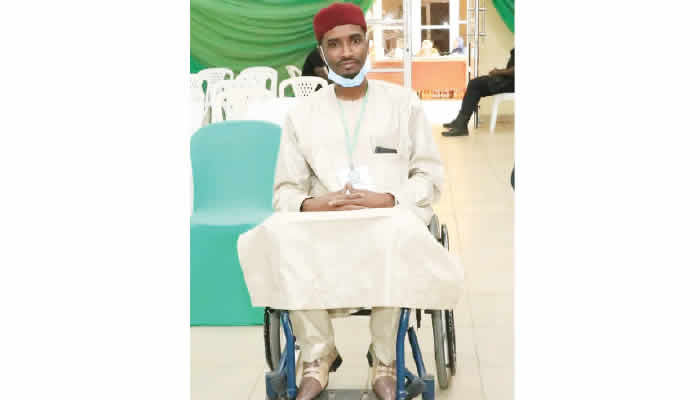
During the #EndBadGovernance protest in Bauchi State, a viral video captured policemen engaging in a physical altercation with Hamza Waziri, who was in a wheelchair. The Chevening scholar, in this interview with UMAR SANI, narrates his experience with the security forces and sheds light on the challenges facing people with disabilities in Nigeria.
Could you please introduce yourself?
I am Hamza Waziri Muhammad, Chairman of the Initiative for The Liberalisation of Physically Challenged People in Nigeria, an NGO dedicated to addressing social issues, providing welfare, employment opportunities, and education for individuals with disabilities nationwide. Formerly, I served as the Chairman of the Bauchi State Agency for Persons with Disabilities.
What events led up to the altercation with the police during the protest at the Bauchi State Government House?
On August 1, we responded to the call to demonstrate against the prevailing economic challenges in the country. People with disabilities, like myself, are affected by the systemic issues faced in the state. Despite many of us being graduates, the lack of employment opportunities persists. After unsuccessful attempts at securing a job or scholarship, I established a business to empower individuals with disabilities by providing jobs and paying them a fair wage. Our peaceful protest aimed to highlight the need for inclusive employment practices and government compliance with existing laws mandating a five per cent employment quota for people with disabilities. Unfortunately, the police intervened aggressively during the demonstration, resulting in a physical confrontation that was recorded and subsequently shared widely online.
Were you injured during the altercation?
As I speak, I am still experiencing discomfort, particularly in my ribs. Despite seeking medical attention, challenges such as network issues have hindered thorough examination and treatment.
Do you plan to take legal action against the police?
I am in discussions with the association of lawyers with disabilities in Nigeria regarding potential legal recourse. I firmly believe in upholding justice and holding those accountable for the brutality I endured.
Are government representatives adequately addressing the needs of the disabled community?
Often, once individuals with disabilities assume positions of power, they neglect their advocacy roles and prioritize political agendas. The enforcement of policies, such as the five per cent employment quota, remains inadequate despite being enshrined in law since 2018. Limited progress has been made in creating accessible spaces and ensuring equal opportunities, as exemplified by my failed scholarship application despite meeting the criteria and receiving minimal support from relevant bodies.
In the field of education, the lack of accessibility for people with disabilities is a prevalent issue. The same goes for the business sector, where individuals with disabilities often struggle to access grants and support. There is still a significant distance to cover in addressing these challenges.
To improve the quality of life for people with disabilities in the country, what measures do you believe should be taken?
An inclusive approach is crucial, guided by the principle of ‘nothing for us without us.’ People with disabilities should be actively involved in all levels of governance and government agencies, not limited to charitable initiatives. Their representation should extend to sectors like banking, agriculture, education, and various government entities. Recognizing the immense potential and talents within this community, the government needs to integrate them more effectively.
Is there evidence indicating inadequate representation of people with disabilities in government agencies?
While a 5% quota for individuals with disabilities may seem substantial, the actual presence in key institutions like CBN, NCC, or NNPC is notably lacking. Often, those few representatives who are present are there due to privilege and nepotism, rather than merit-based appointments. This trend of favoritism undermines the true representation of people with disabilities in decision-making roles. Personal experiences, like struggling to secure job interviews despite qualifications, highlight the systemic barriers faced by this community.
With the deteriorating economic conditions in Nigeria, how are people with disabilities impacted?
The worsening economic situation has placed immense strain on individuals with disabilities, who already face significant challenges. Many rely on begging as their main source of income, further exacerbated by the general population’s struggles to afford basic necessities. Economic hardships have forced businesses owned by people with disabilities to shut down, leading to job losses and increased vulnerability. The lack of support and opportunities adds to their plight, pushing some to the brink of desperation.
What is the current situation for people with disabilities in Bauchi, specifically?
In Bauchi, a significant number of individuals with disabilities have relocated to neighboring states due to limited opportunities and marginalization. Those who remain face challenges like police brutality when advocating for their rights. The lack of infrastructure and adequate support forces many to fend for themselves in harsh conditions, with little government intervention. There is a growing sense of disillusionment among educated individuals with disabilities, underscoring the urgent need for meaningful change and inclusivity.
As the CEO of the Initiative for Liberalisation of Physically Challenge People in Nigeria, how have you impacted the lives of people with disabilities?
Through various initiatives and advocacy efforts, I have made significant strides in improving the lives of people with disabilities. During the COVID-19 pandemic, I distributed relief items to over 200 individuals with disabilities in Bauchi, filling a gap left by government support. I facilitated fully funded scholarships and educational opportunities for this community, empowering them to pursue their aspirations. Despite facing setbacks like the destruction of my business, I remain committed to mentoring and supporting others like me. The lack of external support and empowerment programs leaves many individuals in a precarious position, emphasizing the urgent need for sustained efforts towards inclusivity and support.
